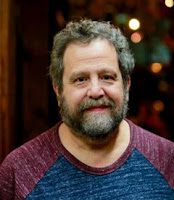D.W. Buffa's recent novel is
The Privilege, the ninth legal thriller involving the defense attorney Joseph Antonelli. The tenth,
Lunatic Carnival, will be published soon. He has also just published
Neumann's Last Concert, the fourth novel in a series that attempts to trace the movement of western thought from ancient Athens, in
Helen; the end of the Roman Empire, in
Julian's Laughter; the Renaissance, in
The Autobiography of Niccolo Machiavelli; and, finally, America in the twentieth century, in
Neumann's Last Concert.
Buffa writes a monthly review for the Campaign for the American Reader that we're calling "Third Reading." Buffa explains. "I was reading something and realized that it was probably the third time that I knew it well enough to write something about it. The first is when I read it when I was in college or in my twenties, the second, however many

years later, when I wanted to see if it was as good as I remembered, and the third when I knew I was going to have to write about it."
Buffa's
"Third Reading" of Thucydides’ History of the Peloponnesian War begins:
Thomas Hobbes, an extremely careful writer, was the first to translate into English Thucydides’ History of the Peloponnesian War. He noted what a careful writer Thucydides had been: The “narrative doth secretly instruct the reader, and more effectually than can possibly be done by precept.” To show that this was not a novel, seventeenth century, interpretation of how careful writers wrote, Hobbes cited the fourth century Roman history of Ammianus Marcellinus: “Marcellinus saith, he was obscure on purpose; that the common people might not understand him. And not unlikely; for a wise man should so write (though in words understood by all men), that wise men only should be able to commend him.” The History of the Peloponnesian War may not be the straightforward account that, on first, or even a second, reading, it might seem to be.
In a line often quoted, if not always understood, Thucydides insists that, “My work is not a piece of writing designed to meet the taste of an immediate public, but was done to last forever.” Thucydides knew from the beginning that the war between Athens and Sparta was the biggest war that had ever taken place, bigger by far than the Trojan War, the war made famous by what Homer wrote, that war that without Homer would have long since been forgotten. Those who claimed to see the future said the war would last three times nine years; it lasted even longer than that.
If the Trojan War began over a woman, the Peloponnesian War had a larger cause. Athens had become...[read on]
About Buffa's recent novel
Neumann’s Last Concert, from the publisher:
Neumann’s Last Concert is a story about music and war and the search for what led to the greatest evil in modern history. It is the story of an American boy, Wilfred Malone, who lost his father in the early days of the Second World War and a German refugee, Isaac Neumann, the greatest concert pianist of his age when he lived  in Berlin, but who now lives, anonymous and alone, in a single rented room in a small town a few miles from San Francisco.
in Berlin, but who now lives, anonymous and alone, in a single rented room in a small town a few miles from San Francisco.
Wilfred has a genius for the piano, “a keen curiosity not yet corrupted by vanity” and “a memory that forgot nothing essential.” Neumann, alone in his room, is constantly writing, an endless labyrinth of questions and answers, driving him farther and farther back into the past, searching for the causes, searching for the meaning, of what happened in Germany, trying to understand what had led him, a German Jew, to stay in Germany when he could have left but instead continued to perform right up to the night that during his last concert they took his wife away.
Neumann’s Last Concert is a novel about the great catastrophe of the 20th century and the way in which music, great music, preserves both the hope of human decency amidst the carnage of human insanity and the possibility of what human beings might still accomplish.
Visit
D.W. Buffa's website.
Third reading: The Great Gatsby.
Third reading: Brave New World.
Third reading: Lord Jim.
Third reading: Death in the Afternoon.
Third Reading: Parade's End.
Third Reading: The Idiot.
Third Reading: The Decline and Fall of the Roman Empire.
Third Reading: The Scarlet Letter.
Third Reading: Justine.
Third Reading: Patriotic Gore.
Third reading: Anna Karenina.
Third reading: The Charterhouse of Parma.
Third Reading: Emile.
Third Reading: War and Peace.
Third Reading: The Sorrows of Young Werther.
Third Reading: Bread and Wine.
Third Reading: “The Crisis of the Mind” and A Man Without Qualities.
Third reading: Eugene Onegin.
Third Reading: The Collected Works of Thomas Babington Macaulay.
Third Reading: The Europeans.
Third Reading: The House of Mirth and The Writing of Fiction.
Third Reading: Doctor Faustus.
Third Reading: the reading list of John F. Kennedy.
Third Reading: Jorge Luis Borges.
Third Reading: History of the Peloponnesian War.
--Marshal Zeringue
 raising questions about justice, motherhood, career, class, and the thorny mechanics of redemption. She previously penned eight works of Southern fiction, all of which have a murder mystery or thriller lurking inside the family drama. Her critically acclaimed work has been translated into more than a dozen languages, and Jackson is also an award-winning audiobook narrator. She lives in Decatur, Georgia, with her family.
raising questions about justice, motherhood, career, class, and the thorny mechanics of redemption. She previously penned eight works of Southern fiction, all of which have a murder mystery or thriller lurking inside the family drama. Her critically acclaimed work has been translated into more than a dozen languages, and Jackson is also an award-winning audiobook narrator. She lives in Decatur, Georgia, with her family.






































